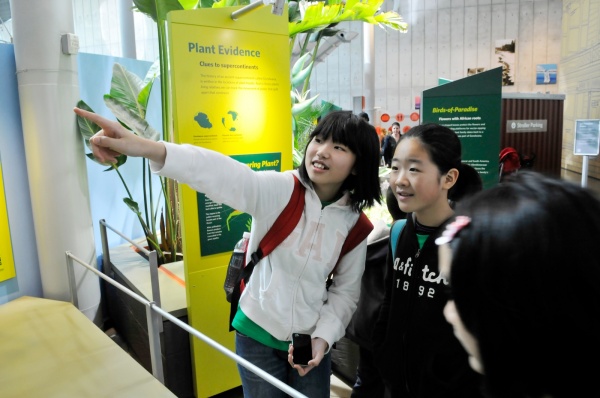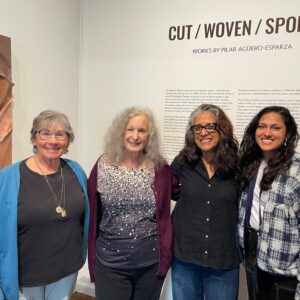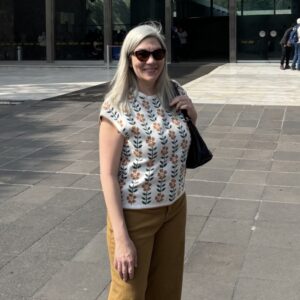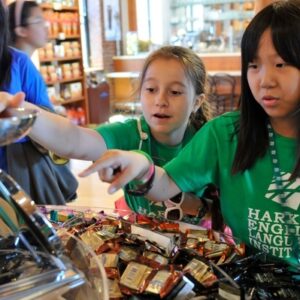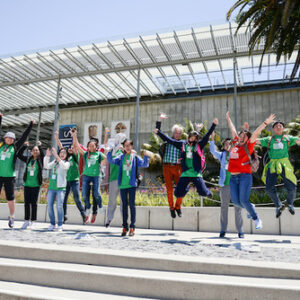At first glance, the group seated in a classroom in the upper school’s Shah Hall looked like typical summer school students. They sat attentively, their desks arranged in a semi-circle around their instructor, casually dressed in blue jeans, T-shirts and sneakers, backpacks lying by their feet on the floor.
Yet on second look, it became apparent that they were from diverse Asian and European countries, and spoke with heavy accents. Meanwhile, on a table at the back of the classroom, stacks of brochures from a range of boarding and other schools were prominently on display.
It was all part of Harker’s well-established English Language Institute (ELI) program, which runs annually every summer and this year kicked off with a welcome reception for ELI participants and their guardians on June 24.
The globally recognized program attracts international students ages 6-16 who are bound for either American boarding schools, universities or internationally-based primarily English speaking schools. They come to ELI to prepare for and increase their chances of admission to their next educational institution.
“ELI is a smart thing, and a good idea. It’s a unique opportunity,” said Joe Rosenthal, Harker’s executive director of advancement, who recently addressed an advanced study group of about 20 middle school-aged students on the topic of “Study in the USA.” Down the line, other guest speakers will include presentations from two visiting boarding school directors.
Addressing the issue of societal norms, Rosenthal noted that different cultures have different etiquette. For example, in the U.S. it’s considered good manners to look a person in the eye, whereas in other countries that might be viewed as offensive. “Here in the States, your number one tool is your smile … just remember it’s okay to make mistakes …” advised Rosenthal, noting that admissions directors from some of the finest boarding schools worldwide come to Harker to personally meet with the ELI students.
Wrapping up his lecture, Rosenthal gave some wise words of advice. “In our culture we place great emphasis on finding meaningful work and helping to make the world a better place.” He then gave an example of a former ELI participant and Harker student, designer Alexander Wang (MS ’98), now a major figure in the fashion world. After spending time in ELI programs during his formative elementary years, Wang quickly worked his way into regular Harker school classes.
The most advanced ELI students, usually middle and high school-aged, stay at the Saratoga campus and work on special projects tailored to their needs, including SAT preparation. They are assisted by mentors (called buddies or conversation partners) who are Harker juniors, seniors or recent graduates.
For the younger ELI students, instruction takes place at Harker’s lower school campus. At the conclusion of formal instruction each day, learning for these students continues with enrichment programs, such as swimming and playing games. Often they are able to join in activities with children attending the regular on-site summer camp, allowing them to have fun while improving language skills. They also enjoy outings to such kid-friendly locations as “Pump it Up!”
On field trip days ELI students of all ages can be seen sporting green program T-shirts as they head out for cultural adventures to such diverse attractions as: the Golden Gate Bridge, the Exploratorium, Academy of Science, Monterey Bay Aquarium, Santa Cruz Natural Bridges State Park and the Tech Museum.
ELI participants travel here with a parent or guardian and often choose to stay next door in the Oakwood Apartments, with which Harker has a special arrangement. Some opt to live with friends and relatives in the area instead. An initial coffee and tea reception was held at the Oakwood Apartments for all the adults to enjoy and get to know one another.
According to Anthony Wood, ELI director, there are two big changes to the program this summer. One is the addition of advanced class seminar instructor Ted Ufijusa. “He brings a wealth of teaching experience and will focus on enhancing English skills in this integral component of our program,” said Wood.
The other is a notable increase in enrollment at the beginner level with ELI students over at the lower school campus. In fact, session three will have 30+ students, which is a first, utilizing three teachers.
Karen Glovka, ELI primary program teacher, said the program for younger students teaches English in the context of what children like to do. True beginners, who know no English, learn greetings, colors, shapes, numbers, the alphabet (names of letters and sounds), school and family vocabulary. Students with more developed skills work on reading and writing, as well as new vocabulary words and verb tenses.
“Much of the teaching is geared to the ELI field trips and afternoon camp activities. For example, a trip to the Monterey Nay Aquarium involves a marine animal unit. Learning is also hands-on using toys and art projects to help the children understand concepts in English. Instruction is also highly individualized so that the students can progress as much as possible,” explained Glovka.
Often times these children are so busy having fun, the learning doesn’t even feel like hard work. “I like reading and playing with my friends,” enthused one youngster, ELI first-time student, 8-year-old Lily Yang, who came to the program knowing little English.
At the end of their time at Harker, ELI students, upon full completion of either a three- or seven-week course, are eligible to receive a certificate (handed out during an official closing ceremony) and recommendation from their teachers. They will also have likely gained new friendships and increased confidence in their ability to travel, speak and learn in the States.
